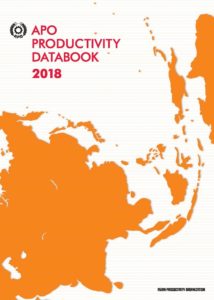e-Books
Subject Index Agriculture | Annual Report | Green Productivity | Industry and Services | Public Sector
The new second edition of the APO Knowledge Management Facilitators’ Guide (KMFG) reflects the updated APO KM Framework, ISO 30301 Knowledge Management Standard, and Industry 4.0 smart technology adoption. The five revised modules show how to navigate the transition to a digital society, manage change and knowledge, and remain agile, sustainable, and productive. The updated 42-item KM Assessment Tool in the KMFG Appendix is invaluable for KM consultants serving public- and private-sector clients in different socioeconomic settings.
Innovative elements of the APO Productivity Databook 2019 include 20 country and five regional profiles, plus improved total factor productivity estimates considering land capital and labor quality changes. Productivity measurements based on official data enable meaningful comparisons of economic growth and support evidence-based policy formulation. Projections of economic growth and labor productivity in the Asia-Pacific through 2030 are included to assist in updating target levels. The newest databook details the diverse stages and pace of socioeconomic development of APO members as well as reference economies.
Projections of economic growth and labor quality changes in member countries up to 2030 are new features of the 2018 APO Productivity Databook, with expanded total factor productivity estimates and city productivity coverage, taking the effects of the smart digital revolution into account. Detailed analyses of productivity and economic performance in Asia-Pacific and reference economies enable comparisons at different development stages. These precise productivity measurements are part of APO efforts to improve policymaking, contributing to higher standards of living.
A collaboration between co-authors from six APO member countries plus the UK, this volume addresses the importance of increasing the productivity of all engaged in knowledge work in the public sector. The eight chapters review principles underlying effective practices of knowledge workers, explain how their productivity can be assessed, and recommend future directions to improve organizational knowledge productivity to add value to public services in an era of innovative changes affecting all socioeconomic spheres.
The 2017 APO Productivity Databook builds on the comparative analysis approach covering APO members, reference economies, and economic groupings to give a comprehensive picture of factors affecting productivity gains. New introductions include: total factor productivity estimates for Lao PDR; revisions of economic growth figures from the late 1990s for nonmember Myanmar; and analyses of hourly wage differentials among employees, the self-employed, and contributing family workers, which are especially relevant for mid- to long-term economic research and planning.
The ninth edition of the APO Productivity Databook contains comprehensive cross-country comparisons of economic growth, structural change, and productivity performance in Asian and global reference economies, with recent revisions in the System of National Accounts reflected. Total factor productivity estimates for Nepal and preliminary per-worker labor productivity data for selected Asian cities are new features.
This guidebook is meant for NPOs aiming to introduce a business excellence (BE) model or awards for the public sector or to enhance their existing schemes. The importance of BE models is introduced through a series of questions and answers, followed by information on promoting and adopting BE and setting up an award process. The final of seven chapters explores how NPOs undertake BE initiatives in the all-important public sector.
Influenced by the “new public management” concept, the APO and other institutions are rethinking how to measure productivity in the public sector, since its roles affect the lives of all citizens. Along with overviews of methods used in Australia, Finland, New Zealand, and the UK to improve public services, efforts in eight APO members are examined in detail, focusing on their tax and passport agencies.
The 8th edition in the series presents comparative data on productivity and economic growth covering 30 Asian economies and Australia, the EU, Turkey, and the USA as reference economies covering 1970–2013. The productivity measures in the report are based on data and estimates developed for the APO Productivity Database project since 2007.
After a comprehensive overview, this publication highlights the different policy measures taken by the governments of seven Asian economies to stimulate innovation among SMEs. It contributes to the current discourse on the importance of financing innovations to create a conducive environment for long-term SME growth.



